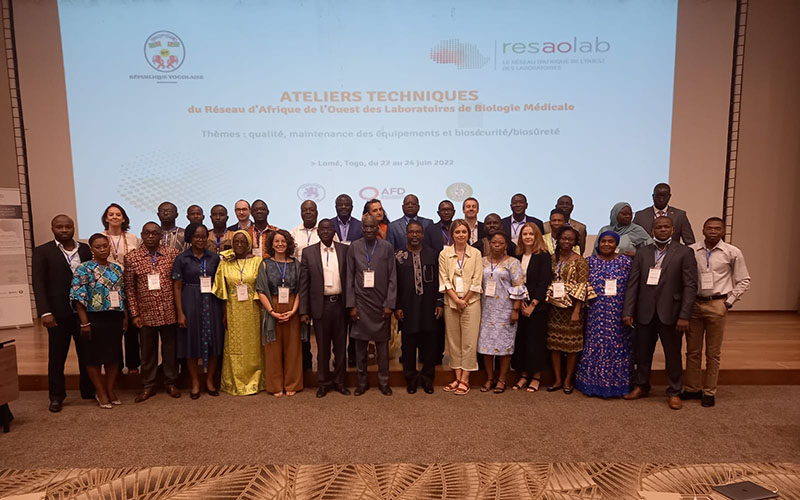
RESAOLAB members participating in the Technical Workshops
The technical workshops were held over three days at the Hôtel 2 Février in Lomé and were attended by around 40 participants. The topics they covered were quality, equipment maintenance and biosecurity/biosafety in the laboratory.
The opening ceremony was attended by, amongst others, Pr Mounerou Salou, representing the Ministry of Health in Togo, Tatiana Maniez, representing the AFD Togo, Dr François-Xavier Babin, Director of International Operations at the Mérieux Foundation, and Pr Jean Sakandé, International Network Coordinator. Representatives of the WHO and the WAHO in Togo were also present, respectively Dr Kiswendsida Ouedraogo and Dr Wadagni Sossa.
Over three days, the participants were able to take part in three workshops focusing on the development of national External Quality Assessment programs, the management of maintenance for laboratory equipment, and the presentation of the new recommendations from the WHO’s biosecurity/biosafety manual for updating national guidelines and framework documents. The workshops involved presentations, the sharing of experiences and group work.
Capitalization of training in the maintenance of laboratory equipment
The preliminary results of a survey of participants in the training session on equipment maintenance were also presented. The results of this study were passed on to representatives of the departments in charge of laboratories for the RESAOLAB member states. This information was shared with the objective of encouraging better use of the available skills to improve laboratory equipment maintenance systems, which is extremely important for the quality of diagnosis.
4th edition of the WHO laboratory biosecurity/biosafety manual
The new version of the World Health Organization biosecurity/biosafety manual was also presented during a remote intervention by Kathrin Summermatter (Head of the Biosafety Center of the Institute of Infectious Diseases of the University of Bern, WHO expert). This manual introduces the notion of risk analysis to determine safety measures and guarantee biological safety, replacing the risk level and biosafety approach. During this intervention, the use of the manual and monographs was presented to participants as a guideline and resource for biosafety professionals and national regulators.
These workshops were organized as part of the third phase of the RESAOLAB project. Financed by the AFD, this phase aims to continue the development of medical biology in Benin, Burkina Faso, Guinea, Mali, Niger, Senegal, and Togo, as well as improving regional cooperation with a coordinated and harmonized intervention approach between these French-speaking West African countries. In close partnership with the respective Ministries of Health, the project focuses on providing targeted action in two main subject areas: the pursuit of institutional development and support for the implementation of national medical biology policies, and the reinforcement of technical capacities in terms of biological diagnosis in the seven countries.
About RESAOLAB
A system of medical biology laboratories providing high-quality services is an essential requirement for improving population health. The West African Network of Biomedical Analysis Laboratories (RESAOLAB) is the first regional program in West Africa to provide a response to this public health concern. Designed with West African healthcare stakeholders, it takes into consideration all the factors affecting the laboratories’ governance and performance. Its objective is to improve the quality of medical biology services in seven West African countries, by reinforcing their laboratory systems with a multifaceted regional approach.
RESAOLAB is an innovative network that aims to enhance access to quality diagnostics for vulnerable people in seven West African countries. The project was initiated by the Mérieux Foundation in 2009, in collaboration with the Ministries of Health of Burkina Faso, Mali and Senegal. Four new countries joined the network in 2013: Benin, Guinea, Niger and Togo.
